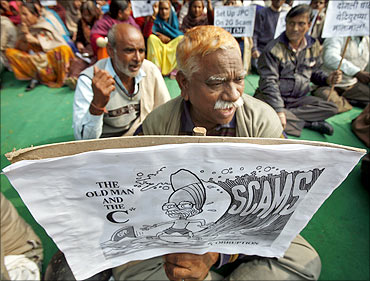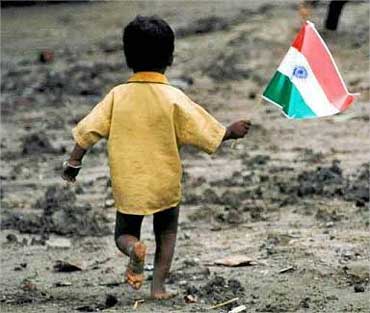V Kumaraswamy
Like in most things in economics, corruption also has two sides - demand and supply. As our satyagrahis focus on the supply side, are we doing enough to tackle the demand for corruption?
Earlier this month, Thailand's Securities Commission's chief had to resign for facilitating a meeting between two groups of shareholders in a listed shipping company in which he owned 100 shares.
The staff cried conflict of interest capable of tarnishing the image of the regulator and refused to work till he resigned. Isn't this the kind of ideal world our Anna Hazares are seeking?
Corruption is an agency problem that exists because the value at which the government sells or allocates its services or resources is much less than its monetary value to the user or purchaser.
Or where the government is the buyer, the price it pays is more than the cost to the supplier or its usual market price.
...
Why are Indians silent on bribe givers?
Image: Corruption can exist in the private sector too.Corruption can exist in the private sector too (such as out-of-turn allotments in cars, educational seats) but is normally corrected quickly by price revisions.
The reverse is equally true. If there is a big difference between the perceived values of services received by the citizens over what the government wants to charge, there is a tendency to avoid paying it and tax evasion and black money are the end results.
The monetary value of a Shatabdi train ticket for a last-minute traveller will vary from person to person: some are more moneyed and some likely to be more desperate.
No matter what the price of tatkal tickets there will be someone willing to pay more, which a smart collector can "extract" as bribe.
...
Why are Indians silent on bribe givers?
Image: Corruption requires two willing and able parties.Like in most things in economics, corruption also has two sides - demand and supply.
Corruption requires two willing and able parties - the giver and taker. The current satyagrahis attempt to solve the problem from the supply side (taker) alone, ignoring near totally the demand side or the price differences.
The "demand" for nepotism, favours and under-priced resources (corruption) comes from us, the citizens, on the retail side, corporations seeking control over some vital assets or licences, or some advantage over competition, etc.
Suppliers to the government make up the rest of the demand side.
...
Why are Indians silent on bribe givers?
Image: Market for corruption will collapse once demand disappears.Likewise if corporations pledge not to pay bribes, for whatever reasons, and we work on ways to control government purchases, the demand for corruption will surely diminish.
In this utopian world with no-one willing to pay bribes, it will become so insignificant as not to bother society. The current efforts hardly address this side of the equation.
Whatever be the effect of current agitations, it would be equally fruitful for them to get each of their sympathisers to get at least 100 citizens and corporations to pledge not to offer bribes, whatever their compulsions.
It would get that extra mile of cleanliness in our system.
...
Why are Indians silent on bribe givers?
Image: Detection and punishment have to be swift and exemplary.Detection and punishment have to be swift and exemplary.
But most administrative functions in India are awfully short-staffed in comparative terms, be it judges per capita or policemen per capita. About vigilance, investigation and prosecution the less said the better. Second, who will appoint the Lokpals and Lokayuktas: the very same machinery - bureaucracy and the political class?
If the appointment of Central Vigilance Commissioner can come into question, fingers are pointed at judges - tenable, credible or otherwise - from time to time, can the appointment of Lokpals be completely rid of biases, preferences and political leanings? Doubtful.
...
Why are Indians silent on bribe givers?
Image: There is a high degree of inappropriateness in the pricing of government services.Influence peddling is in our psyche. Don't we see people in positions of power say: "If you need any help let me know."
It gives us a sense of social status, power, recognition and so on. So long as this exists, corruption and nepotism will persist (even without money changing hands).
There is a high degree of inappropriateness in the pricing of government services. If it is heavily under-priced, it results in corruption and bribery.
If it is overpriced (stamp duty in real estate) it results in tax evasion and black money.
There is a serious need to revisit such areas and close the gaps. Where it is inevitable (like income taxes) the government needs to simplify the rules and substantially increase the administrative muscle and tighten enforcement.
...
Why are Indians silent on bribe givers?
Image: Influence peddling is in psyche.The government does not have a credible or robust price-discovery process for most of its products or resources, more particularly the newer ones like telecom licences.
Perhaps the most significant results in reduction of corruption and black money will come from correcting the mismatched prices.
Any change that does not address this issue is bound to fail prospectively for sure; the ability of satyagraha in tackling the past to bring back the money will surely meet with stiff resistance.
The author is CFO of a large paper company. These views are personal. He can be reached at kumarviru61@yahoo.co.in









article